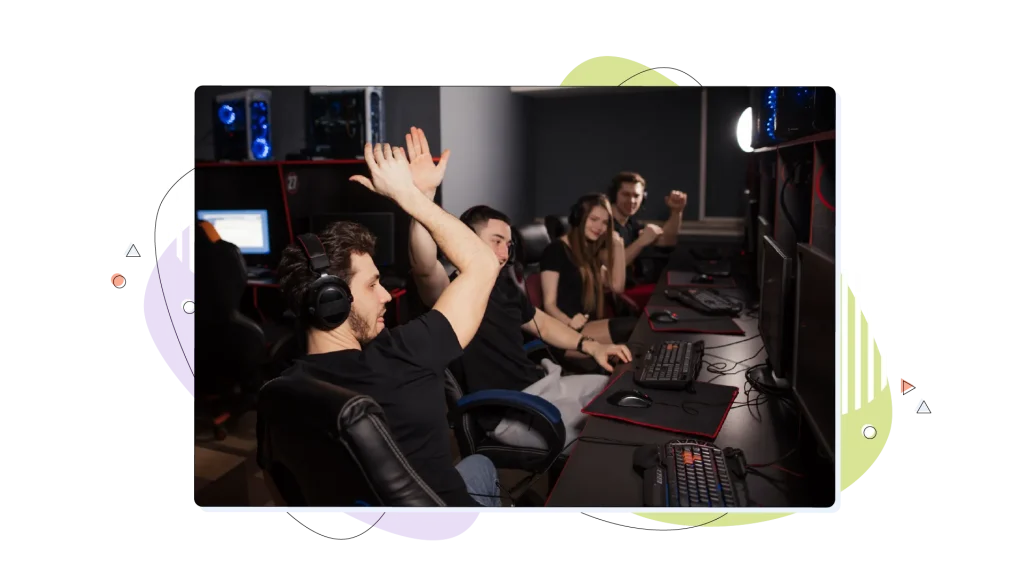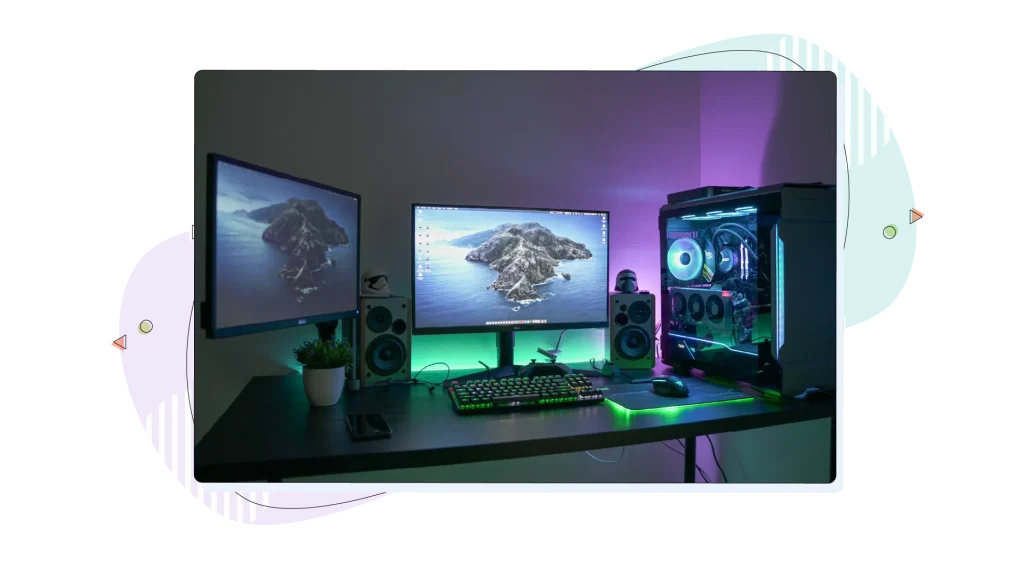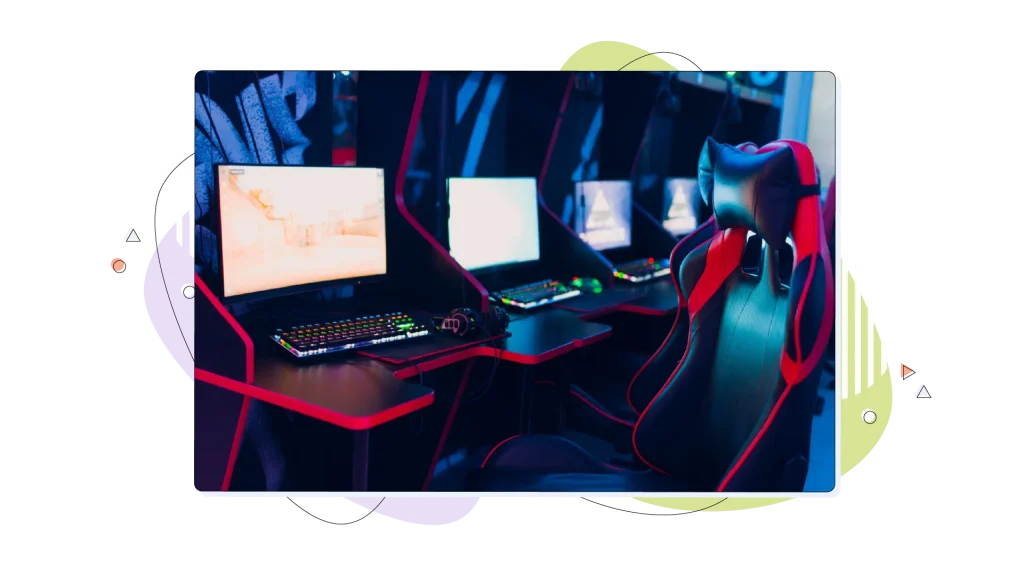Ever been in the middle of a perfect shot, only to have the game freeze for a split second, telling you that the server has crashed or is “experiencing difficulties connecting to the servers“? Or spent hours building the perfect base with your friends, just to have the server crash and lose everything because the host had to log off?
We’ve all been there. The frustration of lag, dropped connections, and the dreaded “host advantage” can ruin an otherwise epic gaming session.
If we focus on some of the most popular games out there, such as Minecraft, it’s evident that the use of dedicated server play a vital role in the gaming experience.
This article is your guide to the ultimate solution: dedicated gaming servers. We’ll explore the mission-critical advantages they offer, from unparalleled performance to complete control over your game world, and show you exactly what to look for.
- What are Dedicated Gaming Servers (& Why Should You Care)?
- Key Use Cases: Who Profits From Gaming Servers
- By the Numbers: The Power of Dedicated Hosting
- Tech Specs Made Simple: What Your Server Needs
- Getting Started: Your Implementation Roadmap

What are Dedicated Gaming Servers (& Why Should You Care)?
The gaming industry generates over $220 billion annually, and a significant portion relies on robust server infrastructure. The dedicated gaming server market grows at 15% annually, driven by the popularity of esports, streaming culture, and remote gaming communities.
Hosting providers entering this market typically charge 300-500% premium rates compared to standard reseller hosting services.
Gaming server clients typically purchase higher-tier packages, additional services like DDoS protection, and frequent hardware upgrades. Average customer lifetime value exceeds standard hosting clients by 400%, making gaming servers extremely profitable for hosting businesses.
A Simple Analogy Everyone Can Understand
Imagine a public gaming server (or a peer-to-peer connection where one player is the host) is like a food court. Many different groups are sharing the same kitchen, cooks, and counter space. When it gets busy, service slows down for everyone, orders get mixed up, and the quality drops.
A dedicated gaming server, on the other hand, is like your own private restaurant kitchen. All the hardware (the processor, the memory, and the storage) is 100% yours. You have your own chefs and your own equipment, all working exclusively on your game.
The result?
Consistent performance, instant response times, and an uninterrupted experience, no matter how intense the action gets.
The 5 Core Benefits of Going Dedicated
So, what do you actually get when you make the switch? Here are the game-changing advantages.
- High performance: With all resources dedicated to your game, you get uninterrupted, high-speed gameplay with minimal lag and lightning-fast loading times.
- Rock-solid reliability: Your server is online 24/7. No more “Host has left the game” messages. Your world remains persistent and available whenever your community wants to play.
- Total creative control: It’s your world, your rules. Install any mods, create custom game modes, set your own player caps, and manage your community exactly how you see fit.
- A fortress of security: Professional dedicated hosting comes with robust security, including DDoS (Distributed Denial of Service) protection. This shields your server from common malicious attacks that can bring down amateur setups.
- Powerful community building: A dedicated server becomes a persistent home for your players. It’s a reliable hub where friendships are forged, massive projects are built, and your gaming community can truly thrive.

Key Use Cases: Who Profits From Gaming Servers
While almost any multiplayer game improves with a dedicated server, some genres practically demand it. Here’s a quick look at a few popular examples.
Competitive Gaming Communities Generate Premium Revenue
Professional esports teams, competitive gaming leagues, and tournament organizers require ultra-low latency servers that deliver competitive advantages. These clients willingly pay premium rates for performance guarantees that standard hosting cannot deliver.
Competitive gaming represents the highest-value segment of the gaming server market. Tournament organizers budget considerable amounts for server infrastructure, creating opportunities for hosting providers to establish long-term contracts with recurring revenue potential.
Content Creators Need Reliable Broadcasting Platforms
Streaming professionals, YouTube creators, and social media influencers host community gaming sessions that require stable, high-capacity servers. These clients generate revenue through sponsorships, subscriptions, and advertising, making server reliability crucial for their business success.
Some of these channels also have their own private game servers, making the use of dedicated servers for game hosting an essential part of their day-to-day operations.
Content creators typically upgrade server capacity as their audiences grow, creating natural expansion opportunities for hosting providers; however, some don’t have the required space at their studios, hence the need for a reliable web host arises.
Successful streamers often transition to dedicated server packages that support hundreds of concurrent players during special events, while having all the dedicated server benefits with full root access, storage space, and exceptional performance, all at a small price.
Gaming Communities Build Persistent Virtual Worlds
Minecraft servers, survival games, and sandbox environments create persistent virtual worlds that operate continuously. These communities develop economic systems, social structures, and collaborative projects that require reliable, always-available server infrastructure.
Community-driven gaming servers generate steady recurring revenue through member subscriptions, donation systems, and premium feature access. Hosting providers benefit from predictable monthly income and low customer churn rates within established gaming communities.

By the Numbers: The Power of Dedicated Hosting
| Genre / Game | Why It Needs a Dedicated Server | Key Resource |
| Survival & Sandbox | ||
| Minecraft, Valheim, Terraria | To support complex mods, huge player-built worlds, and ensure the server is always online for your community to build and explore. | RAM & CPU |
| ARK: Survival Evolved/Ascended, Rust | These games are incredibly resource-intensive, with massive maps and complex AI that require powerful hardware to run smoothly without crashing. | CPU & RAM |
| Competitive (eSports) | ||
| Counter-Strike 2, Team Fortress 2 | For competitive play, every millisecond counts. A dedicated server provides the ultra-low latency and high tick-rates needed for fair, responsive matches. | Network & CPU |
| Co-operative & Horror | ||
| Left 4 Dead 2, DayZ, Project Zomboid | A persistent, reliable server is crucial for saving group progress in long-term survival campaigns and ensuring smooth coordination during intense horde events. | CPU & RAM |
| Creative & Mod-Heavy | ||
| Garry’s Mod, 7 Days to Die | The endless customization and complex, community-created game modes require the raw power and administrative freedom only a dedicated server can provide. | CPU & RAM |

Tech Specs Made Simple: What Your Server Needs
Choosing a server can seem daunting with all the technical jargon. Here’s a simple breakdown of what actually matters for gaming.
CPU (Processor): The Server’s Brain
The CPU handles all the in-game calculations, from player physics to AI behavior. For gaming, single-threaded performance is king. This means a CPU with a faster speed on a single core (measured in GHz) is often better than a CPU with more, slower cores.
- What this means for you: Look for modern processors like the Intel i7/i9 or AMD Ryzen 7/9 series to ensure smooth gameplay, even with many players online.
RAM (Memory): The Server’s Workbench
RAM is the server’s short-term memory, holding all the data it needs to access instantly, like player locations and world data. Not enough RAM causes “lag spikes” as the server struggles to keep up.
- What this means for you: 16GB of RAM is a good starting point for many games, but memory-intensive titles like a heavily modded Minecraft or ARK server might require 32GB or even 64GB for a large community.
Storage: The Server’s Filing Cabinet
This is where your game world, player data, and mods are permanently stored. Speed is more important than size here. NVMe SSDs (Non-Volatile Memory Express Solid State Drives) are the gold standard, offering incredibly fast loading and saving times.
- What this means for you: An NVMe SSD means faster server boot times, quicker world loading for players joining, and a snappier overall experience. Always choose SSD disks over traditional HDDs.
Network: Your Connection to the Players
A great server is useless without a great connection. Look for a provider that offers high bandwidth (at least 1 Gbps port speed) and low latency (ping). Excellent DDoS protection is non-negotiable to keep your server safe from attacks.
- What this means for you: A quality network ensures a stable, lag-free connection for all your players, no matter where they are located.

Getting Started: Your Implementation Roadmap
Phase 1: Market Research & Competitive Analysis
Research local gaming communities, identify underserved market segments, and analyze competitor offerings to find profitable differentiation opportunities. Gaming markets vary significantly by geographic region and game preferences.
Connect with gaming communities through Discord servers, Reddit forums, and local gaming events to understand specific needs and pain points that your hosting services could address effectively.
Phase 2: Infrastructure Planning & Implementation
Partner with established data center providers who offer gaming-optimized network configurations, redundant power systems, and experienced technical support teams. Infrastructure partnerships reduce initial investment requirements and operational complexity.
Start with proven gaming server configurations rather than experimental hardware setups. Establish service reliability before expanding into specialized offerings that require additional technical expertise.
Phase 3: Service Launch & Customer Acquisition
Begin with popular games that have established hosting demand, like Minecraft, Counter-Strike, or ARK. These games provide predictable customer needs and proven revenue potential for new hosting providers.
Offer migration services for customers switching from competitors, including data transfer assistance and configuration optimization. Migration support reduces customer acquisition friction and demonstrates commitment to customer success.
Conclusion: Seizing the Gaming Server Opportunity
Dedicated gaming servers represent a high-growth market opportunity that rewards hosting providers who understand both technical requirements and business potential. The combination of premium pricing, customer loyalty, and consistent demand creates an ideal business environment for growth-focused companies.
The gaming industry continues expanding globally, driven by the ever-growing streaming culture, the esports shift, and increasingly sophisticated gaming experiences. Hosting providers who establish gaming server expertise now position themselves to capture significant market share in this rapidly evolving industry.
Success in gaming server hosting requires commitment to performance, reliability, and exceptional customer service. However, businesses that meet these standards enjoy higher profit margins, stronger customer relationships, and more stable revenue streams than traditional hosting providers experience.
Ready to explore gaming server opportunities for your business? Start now to see how dedicated gaming servers can accelerate your hosting company’s growth and profitability in this expanding gaming market.
FREQUENTLY ASKED QUESTIONS
Can I migrate my existing server to a dedicated solution?
Yes, most hosting providers offer migration services that transfer existing game data, configurations, and player information to dedicated server environments. Migration typically involves scheduled downtime to ensure complete data transfer, but for specifics, you should contact your web host’s customer support.
How much does a dedicated gaming server cost?
The cost can vary widely, typically from $60 to $200+ per month. HostPapa offers many dedicated server options, both unmanaged and managed, backed by a 30-day money-back guarantee and a 100% satisfaction guarantee. The final price depends on three main factors:
- Hardware specs: More powerful CPUs, more RAM, and faster NVMe SSD storage will increase the cost.
- Provider: Different hosting companies have different pricing structures and levels of support.
- Location: The physical location of the data center can sometimes influence the price.
Can I run more than one game server on one dedicated server?
Yes, and this is one of the biggest advantages of a dedicated server. For example, you could run a Minecraft server for your creative community and a Counter-Strike 2 server for competitive practice on the same machine.
You just need to ensure your server has enough RAM and CPU power to handle the load of all the games running simultaneously.
When do I actually need my own game server?
Here’s a good rule of thumb:
- For 2-4 friends playing privately: P2P hosting is probably fine.
- For a growing community (10+ players), a public server, or heavy mod usage: A dedicated server is highly recommended to ensure stability, 24/7 uptime, and a good experience for everyone.




